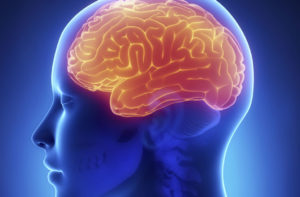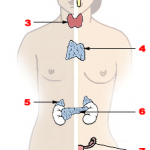 Have you ever felt so stressed out and overwhelmed that you can’t think straight? We now know that prolonged stress or trauma is associated with decreased volume in areas of the human brain responsible for regulating thoughts and feelings, enhancing self-control, and creating new memories. A new research study, published in today’s issue of Nature Medicine, is a first step in uncovering the genetic mechanism underlying these brain changes.
Have you ever felt so stressed out and overwhelmed that you can’t think straight? We now know that prolonged stress or trauma is associated with decreased volume in areas of the human brain responsible for regulating thoughts and feelings, enhancing self-control, and creating new memories. A new research study, published in today’s issue of Nature Medicine, is a first step in uncovering the genetic mechanism underlying these brain changes.
Depressed People’s Brains are More FragmentedIn this study, conducted by Professor Richard Dumin and colleagues from Yale University, scientists compared the genetic makeup of donated brain tissue from deceased humans with and without major depression. Only the depressed patients’ brain tissues showed activation of a particular genetic transcription factor, or “switch.” While each human cell contains more than 20,000 genes, only a tiny fraction of them are expressed at a given time. Transcription factors, when activated, act like light switches, causing genes to be turned on or off. This transcription factor, known as GATA1, switches off the activity of five genes necessary for forming synaptic connections between brain neurons. Brain neurons or nerve cells contain branches or dendrites that send and receive signals from other cells, leading to interconnected networks of emotion and cognition. The scientists hypothesized that in the depressed patients’ brains, prolonged stress exposure led to a disruption of brain systems involved in thinking and feeling. Depressed brains appeared to have more limited and fragmented information processing abilities. This finding may explain the pattern of repetitive negative thinking that depressed people exhibit. It is as if their brains get stuck in a negative groove of self-criticism and pessimism. They are unable to envision more positive outcomes or more compassionate interpretations of their actions.
Glucocorticoids Damage Brain Neurons
The stress response involves activation of a brain region known as the amygdala, which sends a signal alerting the organism to the threat. This results in activation of the HPA (hypothalamic-pituitary-adrenal) axis and release of a cascade of hormones, including cortisol, widely regarded as the quintessential “stress hormone.” While short-term cortisol release prepares the organism to sustain “fight or flight” and fend off an attacker, long-term exposure appears to cause brain neurons to shrink and interferes with their ability to send and receive information via branches called dendrites. In animal studies, under chronically stressful conditions, glucocorticoids such as cortisol can remain elevated for long periods.
Traumatic Experiences Can Shrink the Hippocampus in Those Who Don’t Recover
This finding is another piece of the puzzle regarding how stress and prolonged distress may impair our ability to think in creative and flexible ways. Research in both mice and humans has demonstrated an association between stress exposure (foot shock in mice, life events in humans) and shrinking of the hippocampus – the brain center responsible for forming new, time-sequenced memories. Studies in women with PTSD resulting from childhood sexual abuse and Vietnam veterans with PTSD have shown 12-26 percent decreases in hippocampal volume, relative to those without PTSD. In another study, patients recovered from long-term major depression showed a 15 percent decrease in volume of the hippocampus, compared to non-depressed patients.
Major Life Stress Damages the Prefrontal Cortex
In addition to hippocampal shrinkage, major life stress may shrink brain neurons in the Prefrontal Cortex (PFC), the brain area responsible for problem-solving, adaptation to challenge, emotional processing and regulation, impulse control, and regulation of glucose and insulin metabolism. In a study of 100 healthy participants conducted by Dr. Rajita Sinha and colleagues at Yale University, and published in the journal Biological Psychiatry, those with more adverse life events had greater shrinkage of gray matter in the PFC, compared to their less-stressed peers. Recent major life events, such as a job loss, make people less emotionally aware while life traumas, such as sexual abuse, seem to go further, in damaging mood centers that regulate pleasure and reward, increasing vulnerability to addiction and decreasing the brain’s ability to bounce back.
Summary
While the evidence is not yet conclusive, these studies suggest that prolonged exposure to stress can shrink the brain, both via the damaging effects of cortisol on brain neurons and by disrupting expression of genes that facilitate neuronal connections. This raises the question of whether there is anything we can do to prevent such damage. Since we can’t always control how much we are exposed to financial, relationship, or illness stress, are there preventive activities we can do to maintain cognitive resilience so we can continue to deal effectively with the stressors? It is not known if we can reverse the damage by these methods, but we may lessen it and make our brains more resilient to stress.
Brain-Enhancing Activities to Combat Stress
While the below list is not exhaustive, the three activities below have enhanced brain functioning in controlled studies.
Take a Daily DHA Supplement – DHA or Docosahexaenoic acid is an Omega-3 fatty acid that is a central building block of brain tissue. DHA is thought to combat the inflammatory effects of cortisol and the plaque buildup associated with vulnerability to Alzheimer’s disease. According to Dr. Mehmet Oz, in one study, a dose of 600mg of DHA taken daily for 6 months led the brain to perform as if it were three years younger.
Exercise Most Days – In studies with mice exercise led to a more improved performance on cognitive tasks than exposure to enriched environments with lots of activities and stimulation. Exercise leads to increases in BDNF or brain-derived neurotropic factor, a substance that strengthens brain cells and neuronal connections. BDNF is also thought to promote neurogenesis or the creation of new brain cells from existing stem cells in the hippocampus. Although these effects can’t be studied in living human brains, researchers have found increases in BDNF in the bloodstream of humans following workouts.
Do Yoga, Meditate, or Pray – These activities can activate what scientist Herb Benson at Massachusetts General Hospital calls “the relaxation response,” which lowers blood pressure and heart rate and lowers subjective anxiety. Benson and scientists from a genetics institute showed, in a recent study, that inducing the relaxation response can beneficially alter the expression of genes involved in inflammation, programmed cell death and how the body handles free radicals. The effects shown were in the same genes implicated in PTSD and depression. According to Jeffery Dusek, Ph.D., co-lead author of the study, “Changes in the activation of these same genes have previously been seen in conditions such as post-traumatic stress disorder; but the relaxation-response-associated changes were the opposite of stress-associated changes and were much more pronounced in the long-term practitioners.”
About the Author
Melanie Greenberg, Ph.D. is a licensed Clinical Psychologist and expert on Mindfulness and Positive Psychology. Dr. Greenberg provides workshops and speaking engagements for organizations, life, weight loss, or career coaching, and psychotherapy for individuals and couples. Visit her website: http://www.drmelaniegreenberg.biz
This article originally appeared in Psychology Today.



















